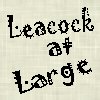|
|
|
 |
||||||
 |
||||||
|
||||||
WORDS, NEW, ODD OR DIRTY On a recent visit to England it was in a headline of the London Daily Telegraph that I noticed the word DOH. How strange, I thought, that they were using Bajan spelling for the word though. But that meaning made no sense for the rest of the headline. So I looked up doh in the SHORTER OXFORD and THE ENCYCLOPAEDIA BRITANNICA finding only that Doh was the name of a shaman in the Finno-Ugric Creation myth. That didn't help either. So I'm still ignorant of the meaning of doh.
Schtum was another word outside my vocabulary, but the sch suggested an origin from German or Yiddish, and the context a meaning of keeping quiet, confirmed by the Shorter Oxford. And how about shant (without apostrophe). It appears to be a drink.
A favourite word in the English dailies and weeklies is spin, and people who practice this non-medical profession are described as spin-doctors. Spin can be defined as a derogatory term in politics, meaning the use of publicity by a prominent figure to imply an intention to bring a desirable reform which is very unlikely to occur. Four letters only to mean all that. The abbreviation should soon spread to North America and Barbados.
Languages have to change with time. Anyone who has had to learn Old English knows about that. In recent times, words from the forties and fifties have become ancient history. Prang, wizard, dosh, posh, bosh, blower (for the phone), crate, top-hole and Hun are all forgotten. I specially enjoy the derivation of the word posh, which meant rich or grand or very well-dressed people. It came from PO meaning port out, and SH meaning starboard home. Going out to India or Australia by ship, a cabin on the port side avoided the nuisance of the afternoon sun, as did the starboard side going home.
Other words of restricted use are those referring to body parts and sexual matters, and are often words of four letters, usually very ancient in origin. If, dear reader, you are younger than sixteen you should omit the rest of this essay. You would not be able to understand it, anyway. At sixteen all will become clear.
For older readers who may feel awkward in discussing these nouns and verbs, I will use the device of incomplete spelling to mitigate their blushes. I mean, of course, the words a..e , b….r , co.. , cu.. , f..t , f..k (and its adverb), p.. , p..s , and naturally s..t . As a group they might be described as A to S words.
To my surprise I found my daughter in Shropshire (farming, horses, nursing) using the word s..t frequently, even in social contexts. She made no apology, but then she is actually a senior member of the nursing profession.
However, in London, my eldest daughter gave a family dinner at which my granddaughter (A-level,
boyfriends) was present. I thought it was time for a Leacock argument so I used the word f…..g, whereupon, to my delight, she said "Grandad, you shouldn't use that word." I asked whether she commonly used the word s..t
and she admitted this horrible usage. The subsequent argument was great fun.
In Victorian and Edwardian times the streets of London were full of horse-s..t, but the words were manure, droppings, or very occasionally excrement. The A to S words were never used in polite society or literature until the twenties, when Lady Chatterley's Lover, by D.H Lawrence (which used almost all of them) was published, rather surreptitiously, in France.
It seems that we really need words expressing anger, indignation or disgust. At school and university damn and blast did the job for me, with the occasional help of the Christian expletive bloody, derived, of course, from By Our Lady. During the wars the need for such words became far greater, and, among the brutal and licentious soldiery, the f…..g word filled every tiny pause, rapidly losing its emphasis, to be replaced by b….r.
However, in the distinguished pages of our Bajan daily newspapers headlines have several times appeared which included the words bugger or buggery in full horrific spelling, once in huge letters on the front page. It seems that since the word was used in legal proceedings it was thought suitable for headlines.
"Grandad" pipes a seven-year-old voice "What does buggery mean?" "Well, darling, it means that a gentleman puts his, er, thingummybob …." Etc. etc. "Is that naughty, Grandad?" "Yes, darling, very naughty." Perhaps those boring law-court pages and a small font size would be more suitable for that awkward word.
What will be the bad words of the twenty-first century? I'm sure that s..t will get even commoner. After all, as a noun it is definitely disagreeable, quite unlike its rival. But perhaps you have a better candidate. How about elitist?
|
Let me hear your comments: e-mail me at jackleacock@jackleacock.itgo.com |
| [Home] [Archive] [Biography] [Recommended Reading] [Privacy] |